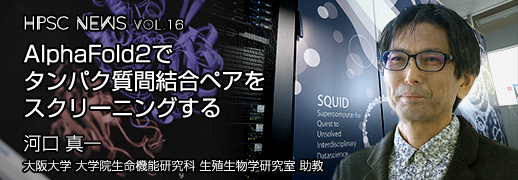
Researcher: Shinichi Kawaguchi
Affiliation: Germline Biology Group, Graduate School of Frontier Biosciences, Osaka University
Abstract: There are about 10,000 to 20,000 different types of proteins in the cell, often forming complexes that are responsible for the physicochemical reactions of biological phenomena. Therefore, attempts to experimentally explore the binding of the protein under study to other proteins are widely performed. Recently, an AI program called AlphaFold2, developed by DeepMind, has attracted attention for its ability to predict protein monomer and complex structures from amino acid sequences. In this study, I attempted to use AlphaFold2 to rapidly screen protein complexes to aid in functional analysis. AlphaFold2 is operated on SQUID, and the computational flow was constructed to enable the prediction of about 150 pairs of complexes per day. In silico screening of proteins, assuming 1:1 binding, yielded a high reliability score for a number of pairs, corresponding to about 1% of the total. Today, AI programs are being actively developed and innovative technologies are having a profound impact on the life sciences, and the early adaptation and validation of such AI technologies, not only AlphaFold2, is expected to provide an opportunity to bridge the gap between experimental and computational science.
Posted : May 13,2024

